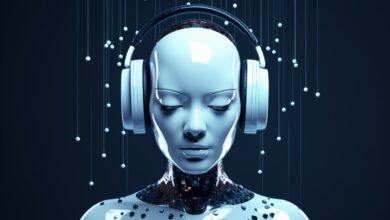
We have seen huge advancements in the field of AI over the last 20 years with the development and popularisation of personal computers and computer hardware. This evolution provided the processing power needed for researchers to begin training AI using huge datasets. Working with these vast amounts of data allowed for the subsequent development of machine learning (ML) and deep learning (DL). This led to computer vision, speech recognition and natural language processing, all crucial elements to how search engines and search engine optimisation work.
Search engine optimisation and AI
Say you have a webpage and, as an analyst, you need to know whether or not it will receive clicks. That webpage is processed by an AI-powered model which scans various elements of the page such as headlines, titles, and meta descriptions. When you show this model your webpage, it will make a random prediction on how many clicks that website might receive.
Now, imagine running millions of user-generated data points through an algorithm that can be trained. This algorithm will first be presented with training data, which will then be iterated. The model will then be updated to reduce errors and make better predictions based on actual data. Once the model is trained to predict user behaviour, the algorithm will give a much more accurate prediction on whether or not the specific webpage will get clicks.
Working with these vast amounts of data allowed for the subsequent development of machine learning (ML) and deep learning (DL), crucial elements to how search engines and SEO strategies work.
Deep learning and search engines
Deep learning, a subset of machine learning, is based on neural networks inspired by the neural networks of the human brain. Deep learning models employ several layers of neural networks, unlike pure machine learning. In other words, instead of a few parameters to optimise, the learning algorithm could have millions. As a result, deep learning models require a huge amount of training data, as well as significant computing power, to train. With so much data needed to train the algorithms, it’s not surprising search engines are using automation and deep learning. After all, they probably have access to some of the biggest datasets on the web.
At a basic level, search engines rely on three processes: crawling, indexing, and ranking. Simply put, the search engines “grab” content from the internet, figure out what the content is about, compare it to the information users are looking for, and finally, rank which information best matches the user’s query at any given time. However, there is such a vast amount of content on the web that a big challenge emerges: how to index and crawl the information effectively and accurately.
In 1998, Google had 26 million indexed pages, by 2016 that number stood at 130 billion. A drastic increase. In an attempt to alleviate this issue, search engines have gone from brute-forcing their way through web pages, to automating these processes using advanced algorithms to detect patterns and make predictions about web pages, in order to crawl as many pages as possible.
With advanced AI technologies like Google’s Bert and Microsoft’s exclusive use of GPT-3, search engines are heavily investing in AI to better understand content and the intent behind search queries, to both improve and personalise a user’s search experience.
The future of Organic Search is AI
The simple keyword approach stopped working for marketers the moment AI was introduced to search engines. With search engines using AI to make their work more efficient, SEO marketers should be doing the same to have their webpages found, as well as crawled, indexed and ranked.
But marketers can’t just use any odd AI algorithm; taking an algorithm that’s trained to suggest content based on preferences such as those in social media platforms will not be much help to marketers for example. They need to either develop and train their own systems or turn to partners with developed and specially trained algorithms to see webpages in the eyes of a search engine – the way a search engine would. These AI and machine learning-based algorithms will help marketers test and optimise websites, especially big bulky corporate websites with numerous pages, making them more visible to search engines.
In this day and age, an overwhelming majority (90%) of marketers have already embraced AI and believe it is helping them not only perform better but is also advancing their careers. Botify’s recent research showed that AI is already helping them in analysing data at scale (40%) and improving site accessibility (36%) among other things. However, this uptake is driven by the marketing agencies, speaking volumes about the attitudes towards AI in marketing for in-house teams. If they keep relying on outdated keyword tips and tricks, they risk falling behind. It is time for companies to begin using the same tools as the ones used by the platforms they want to be featured on, in this case, search engines. And they can’t do that without AI. Understandably, companies are unlikely to have the resources to develop these solutions in-house, so their best first step would be to turn to existing solutions.




